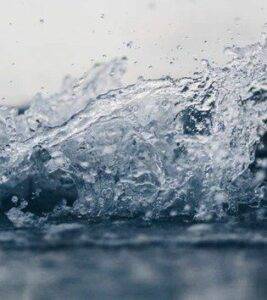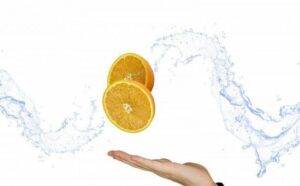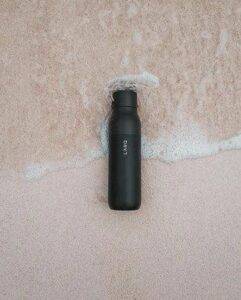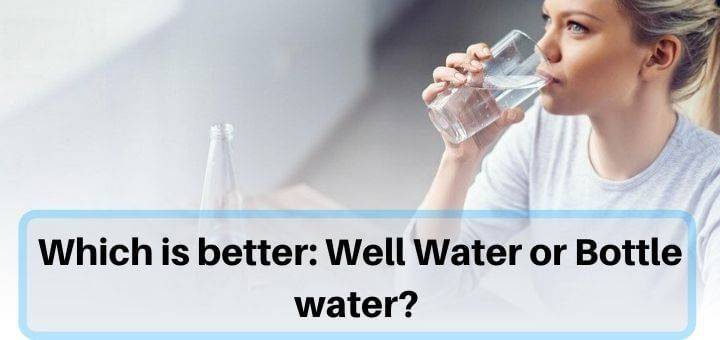Water is essential for the survival of organisms. It’s a well-known fact that one can survive for several weeks without food but it only takes three days for one to go without water. In this article, we’ll look at well water as a source of water and compare it with bottled water. Is well water better than city water?
How safe is well water, and is it better than city water?
The National Ground Water Association (NGWA) indicates that unfiltered well water is terrible for you. The well water isn’t 100% pure. It is not safe for drinking, showering in, for your skin, or cooking with because the well water contains contaminants such as microorganisms and broken down minerals.
Water Problems and How to Make It Safe for Use
Well, water is underground water, which gathered inside pore spaces of bedrocks and sediments. The quality of this water is affected by a combination of natural processes, biological, physical, and other factors.
A vast majority of American citizens depend on groundwater for basic water supply needs, and it’s vital to ensure that the water they use is safe.
It’s recommended by the Environmental Protection Agency (EPA) that health department professionals continuously test the well water through standard water quality indicators (WQI) by testing and measuring the presence of pollutants such as disease-causing bacteria and germs along with different safety measures.
Well, water problems and their treatment options are;
1. Hard Water
Hard Water is a problem associated with high levels of calcium and /or magnesium, which are dissolved from certain rocks and minerals into the water. Hard Water has several effects, which include; on your skin, hair, clothes, faucets, dishes, bathtubs, pipes, and other plumbing fixtures.
It causes dry skin and flakey hair, rough and faded clothes, and the formation of deposits on pipes and faucets leading 
Naturally, you can soften the hard water by boiling away the impurities and then letting the sediments settle to the bottom before transferring the water to another container through a water filter. Transfer the water back and forth to another container again repeatedly. This will increase the level of oxygen in the water.
2. Iron and Manganese
Iron and manganese present in water are felt particularly by a bad metallic taste of water, which is caused by metal-carrying minerals contacting with water. The mineral dissolves in water, releasing iron and magnesium into the groundwater.
The presence of iron and magnesium is noticed when the water contains black or grey specks, cloudy orange water, an oily surface, or stains red on sinks and bathtubs.
The treatment method for iron and magnesium depends on the quantities dissolved. For low amounts, you could install a point-of-use water softener on the water filtration system. Higher levels of iron and manganese could be removed through aeration, chlorination, and hydrogen peroxide.
Naturally, you can remove iron and manganese from well water by using a natural green mordenite stone. The process is done by immersing the stone in the well Water. Its efficiency is 1.34- 2.32%/ minute of iron and manganese, which is good.
3. Nitrogen
Nitrogen in groundwater comes in many forms. Most of it comes from the atmosphere while the rest is in the form of ammonia, nitrate, and nitrite, particularly near septic tanks or places with agricultural activities.
Nitrogen is useful to living things, but a high level of nitrate is unsafe for newborn children and infants. It causes methemoglobinemia, which causes decreased blood pressure, disorganizing oxygen flow in the blood and heart, headaches, vomiting, and the skin turning bluish. This disease could lead to severe illness and death.
Detecting the presence of nitrate in well water is done by performing a lab test because you can’t taste, smell, or see nitrate. On detection, nitrate can then be removed through reverse osmosis by adding water softeners. The heating and boiling of well water will not naturally remove the nitrate.
4. Acid water

The presence of acidic water is noticed by testing the pH levels of the water. You could also notice the taste of the water being metallic and bitter or the rust stains in sinks and tubs. The faucets are too corroded, and in some instances, the water appears cloudy.
Acidic water could leach Lead into the water, making it harmful for use. The presence of Lead in Water causes neurological and physical health problems. Acidic water leads to damaged teeth over time, gastrointestinal illness, and damage to the plumbing system, among other issues.
Acidic water can be treated by a backwash neutralizer, which works on well water, installing a calcite neutralizer or soda ash injections using a soda ash feeder to raise the pH levels.
5. Fluoride
The allowable fluoride concentration level is 1.5 mg/l level. above 1.mg/l leads to dental fluorosis, particularly in children under the age of six. Its seen by staining and pitting of teeth. This is only a cosmetic problem that can be handled by a dentist. It could lead to skeletal fluorosis, thyroid problems, or neurological problems, i.e., poorer cognitive outcomes in the future.
The reverse osmosis filtration system can remove fluoride in well water. This process is 90% effective in removing fluoride, including other contaminants such as pesticides, sulfates, chlorine, and detergents.
Naturally, you can remove fluoride from water by using holy basil (Tulsi) .it’s .it’s a proven natural plant that eliminates 80% of fluoride by merely soaking the leaves and stems of the plant in well water containing 7 PPM of fluoride for approximately 8 hours.
How Safer Is Bottled Water?
Many people believe that fancy bottled water is absolutely 100% pure for drinking compared to tap water. However, tests done by the Natural Resource Defense Council show that contaminants and microorganisms are also present in bottled water. Yet, according to the FDA, bottled water products have a different standard of identity.

All ingredients of these products are clearly stated and labeled with their appropriate levels of federal and local regulations.
. Since bottled water companies meet these current Good Manufacturing Practices (cGMPs) minimum safety standards, it’s safe to drink bottled water. It will not harm you; instead, it will make you healthy.
It ‘sIt’s also safe to drink tap water because the agency’s job includes both above-ground and underground public water sources.
Tap Water and Bottled Water Pros and Cons
If you are wondering which is better, tap water or bottled water? Well, here is a breakdown comparing the pros one has over the cons of the other and vice versa.
City Water Pros & Cons of Tap water
The Best Well Water Filter?
1. Aqua boon 5 Micron 10″ x 2.5″ String Wound Sediment Water Filter Cartridge
For a private well, we recommend Aqua boon 5 Micron 10″ x 2.5″ String Wound Sediment Water Filter Cartridge. It’s a market best seller with a solid star rating of 53 %. Most buyers like it over other filters because It’s cheaper and offers excellent value for all your well needs.
The filter provides quality filtration keeping the water flowing while reducing sand, silt, rust, and other scale particles. They last long approximately 4-6 months, improving the clarity and color of your water. It can be used in the kitchen, bathroom, and drinking water systems.
Product information
- Product dimensions; 10 x 4.5 inches
- Lifetime; average replacement of two or three times a year.
- Flow rate; 5 GPM
- Removes both large and fine particles
What our team likes and its benefits
- Quality filtration; its physical quality ensures five zones of filtration to remove whole house sediment filtration and other contaminants from drinking water. The innermost zone filters small dust, then the inner zone filters smaller particles. Then the mid-zone, which is multilayered, ensures efficiency, and, finally, the outer zone, which filters large specks of dust and lengthens the life of the filter.
- Durable; the grooved cartridge provides a more extensive surface area and also enables the filter to last for about four to six months depending on the quality of the water. The sediment replacement water cartridge is useful for taking a shower, kitchen use, laundry, or in drinking water systems
- Compatible with many households, many households can use this water filter. however, you can check with your plumber in case of doubt.
What Are The Benefits Of Well Water?
The benefits of well water include; that it’s cheap. Once it’s dug and necessary equipment installed, you can say goodbye to water bills,
source of healthy water because of naturally occurring beneficial minerals making the well water fresher and high in minerals.
How Do You Make Well Water Taste Better?
The odd taste and smell of water could be a result of sulfite-reducing bacteria, chloride ions, or an imbalance of pH levels. To improve the taste of water, first, consider upgrading your water filter.
A water filter will decrease the level of contaminants, i.e., chlorine or sulfite. A carbon filter will also work well. Secondly, install a water softener, i.e., reverse osmosis systems. It will improve the quality of the well water. Thirdly you can attach a secondary filter to the faucet.
Increase the taste of water naturally, and you can transfer the water from one container to another. this will improve the oxygen levels in the water.
How Do I Know If My Well Water Is Safe?
water quality can change upon revival/refilling. in order to ensure that the well water is undoubted, safety aspects are essential to keep up a healthy private well to ensure you get safe water; these include construction; location, maintenance (has the water quality been checked regularly and mechanical problems), water source (nature of the aquifer from which your water is drawn) is bottled water safe
RELATED ARTICLE:
- Brondell Toto and Bio Bidet Smart Toilets (Comparison) - January 15, 2024
- Toilet flushes but poop stays 2024 - January 15, 2024
- Best Humidifier for a 5×5 Grow Tent-Top Picks for Indoor 2024 - December 11, 2023


